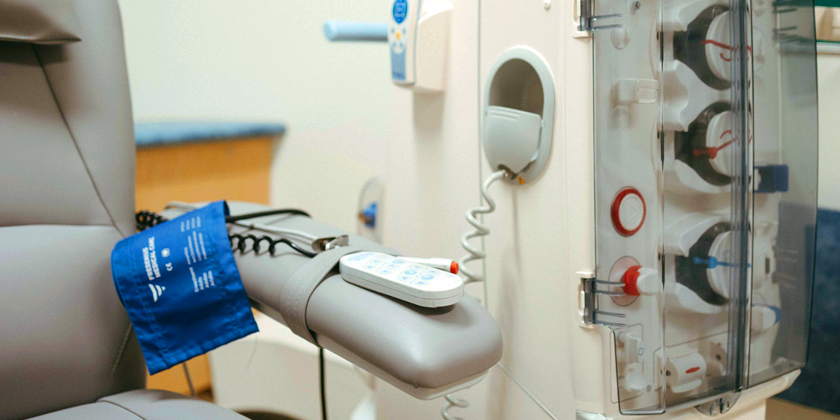Adapting to patient need: The Ottawa Hospital’s new campus increasing access to life-sustaining dialysis
Mar 13, 2024

A current home dialysis machine at The Ottawa Hospital’s Home Dialysis Unit
For people living with end stage kidney disease, dialysis is an essential treatment that helps them maintain a quality of life – literally making the difference between life or death.
The Ottawa Hospital has one of the largest renal programs in Canada for patients without normal functionality of their kidneys. More than 900 patients receive dialysis treatment at 10 different TOH sites, including the Civic, General and Riverside campuses and satellite dialysis clinics in Ottawa and the surrounding region.
As we plan and design what will become one of the largest and most modern hospitals in the country, we’re planning for the future of renal care and adapting to patient need with an expanded nephrology unit that will increase access to life-sustaining dialysis.
Expanding and enhancing renal care
The Ottawa Hospital’s nephrology program encompasses the study and care of kidney physiology, function and health. This includes general nephrology, care for patients with advanced kidney dysfunction, specialized care for patients with cystic kidney disease, glomerular diseases, and hypertension, as well as kidney transplants and dialysis treatment. Dialysis is a major pillar of the program.
Our plans for an enhanced nephrology program at the new campus include a new acute dialysis unit and a home dialysis unit that will increase access to dialysis in our community.
“Right now, our largest dialysis unit has 30 stations. The plan to more than double that number at the new campus is probably the most exciting thing that’s happened in my career,” says Janet Graham, Regional Director of Nephrology at The Ottawa Hospital.

“We are building for the future and creating a purposefully built space where we’re able to provide very specialized care.”
Of the more than 900 dialysis patients in TOH’s renal program, those that receive care at one of our satellite dialysis clinics in the region typically return to the Civic or General campuses when they get sick or need surgery or other interventional treatments.
“By expanding our dialysis stations at the new campus, we’re able to better serve those patients who need to return to the hospital for additional treatment,” says Jolanta Karpinski, Division Head of Nephrology at The Ottawa Hospital. “We’ll also continue serving patients that receive regular, ongoing treatments here all the time.”
Home and nocturnal dialysis
The new campus will have dedicated space for patients in TOH’s Home Dialysis Program. The first of its kind in Ontario, this TOH program provides patients with training and support to have dialysis treatment at home as early as the day they are discharged from hospital.

“Our renal program at the new campus will enhance our efforts to empower patients to live as independently as possible,” says Jolanta. “The new home dialysis unit will have improved space and facilities for the nephrology team to provide training to patients.”
Currently located at the General campus, the nocturnal program will move to the new campus and continue to provide care to patients who require overnight dialysis treatment.
Patient-focused care
Patient experience is at the forefront of the new dialysis unit. It will feature plenty of natural light and be conveniently located close to outdoor spaces and dedicated drop-off points for paratransit and ambulance transfers on the same level as the unit. Individual dialysis stations will have enhanced privacy measures for patients receiving treatment or having difficult conversations with staff about treatment options.
Teams are exploring opportunities for all inpatient rooms to accommodate dialysis machines, so patients can be dialyzed no matter where they’re located within the hospital. Current design plans will also see renal transplant procedures move from the General campus to the new campus. TOH has a large living kidney donation program and recently celebrated its busiest year to date, performing 119 kidney transplants in 2023.
“We’re designing all spaces to be more specific to the needs of patients, which we hope will make things more comfortable for them,” adds Janet. “It’s really exciting to have the opportunity of a new unit with one area that connects the main dialysis unit to the home program.”


